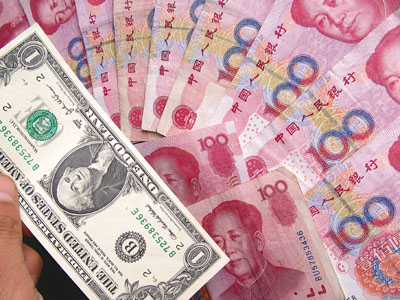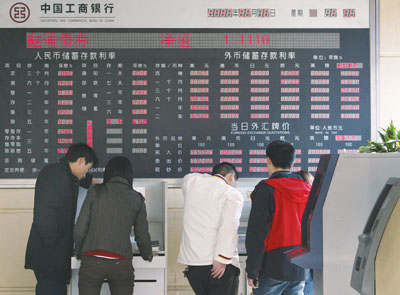
The Chinese currency has appreciated almost 7 percent in less than two years. However, there are still lots of discontented voices, especially when the second China-U.S. strategic economic dialogue is close.
“China should deliver right away a meaningful ‘down payment’ of a 10-15 percent appreciation of the renminbi (yuan) from its current level,” said C. Fred Bergsten, Director of Peterson Institute of International Economics, early this year. He believes 40 percent appreciation of the Chinese currency should be the final goal.
The world opinion on the appreciation of the yuan is based on China’s rapid economic development over the past decade or more. Since 1994, China had implemented a managed floating exchange rate mechanism that was pegged to the U.S. dollar. During this same period, China’s trade surplus and foreign exchange reserves soared. Huge trade surplus and foreign exchange reserves usually lead to trade frictions between nations. The opinion of outsiders was that China’s trade surplus was the outcome of undervaluing the currency by the Chinese Government.
Since 2002, some countries, especially Japan and the United States, have been pressuring China on the exchange rate of the renminbi. On July 21, 2005, the People’s Bank of China declared a 2-percent appreciation of the renminbi, putting the exchange rate at 8.11 yuan against $1. As China implemented a policy of “initiative, gradualness and controllability,” the daily fluctuation of the value of the yuan did not exceed 3 percent. From July 21, 2005 to July 18, 2006, the exchange rate of the renminbi rose to 8 yuan from 8.11 yuan relative to $1, an increase of 1.37 percent within a year. From late August to the end of December 2006, the exchange rate of the renminbi grew to 7.8 yuan from 8 yuan relative to $1. The renminbi appreciated by 2.5 percent within just three months, greatly exceeding the rate of appreciation over the last year. From January to early May this year, the renminbi appreciated from 7.8 yuan to 7.695 yuan against $1. As a result, from July 21, 2005 to May 10 this year, the renminbi has appreciated by almost 7 percent in total, from 8.27 yuan to 7.695 yuan in terms of $1.
The fast appreciation of the yuan has surely affected China’s exports. In contrast to 35.4 percent in 2004, export growth fell to 28.4 percent in 2005, down by 7 percent; and it fell to 25.2 percent in the first half of 2006, further down by 3 percent. The export growth rate should have fallen to 23 percent throughout 2006. On September 14, 2006, however, China declared that tax rebates would be substantially trimmed. Enterprises then accelerated their exports before December 14 that year, which was the deadline for the old tax rebate policy. As a result, there appeared the misleading phenomenon of a big export increase in China from August to November that year. As a matter of fact, China’s exporting enterprises were “eating the food stored up for the next year,” which means that they were exporting in advance. China’s export growth rate in 2006 was 27.2 percent, giving the false impression that the rapid appreciation of the yuan did not affect China’s exports, a pretext for the United States to put further pressure on the renminbi to appreciate further.

During the first China-U.S. strategic economic dialogue held on December 14-15, 2006, the U.S. Treasury Secretary Henry M. Paulson asked the Chinese Government to increase appreciation of the yuan by 5 percent in 2007. On the basis of a 5 percent appreciation, the renminbi should appreciate to 7.44 yuan to $1 at the end of 2007. He also pointed out that the core issue of the China-U.S. strategic economic dialogue was the exchange rate of the Chinese currency. It represented a strong demand from the Bush administration to force a substantial renminbi appreciation in an attempt to narrow the U.S. trade deficit with China. On February 7, Paulson made a speech at the Senate Committee on Banking, Housing, and Urban Affairs, saying that the Bush administration, under the circumstance of a widening U.S. trade deficit, had exerted all efforts to urge the Chinese Government to quicken its steps for the appreciation of its currency. He threatened that China lacked the set of monetary policies expected by the United States and also needed by China; if China did not quicken its step toward currency reform, the international community would lose its patience.
In his speech at the Washington-based Peterson Institute of International Economics on May 2, Paulson said the issue of renminbi appreciation had become a sign of slow progress in dealing with economic issues such as the huge China-U.S. trade deficit. Appreciation of the yuan against the U.S. dollar was very slow, warned Paulson. He said the U.S. Congress was obviously not just likely but extremely likely to pass a bill to intervene.
